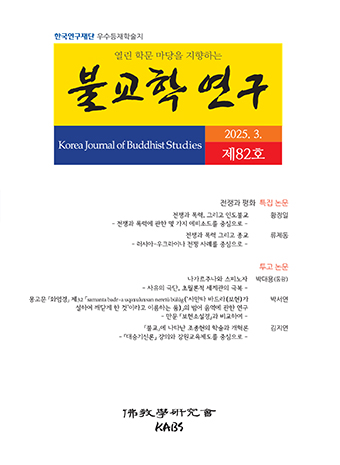Abstract
References
Sorry, not available.
Click the PDF button.
Information
Theravāda Buddhism established a special relation between state power and Buddhist fraternity in Southeast-Asian countries. In fact, the relations between royal authority and Buddhism resulted in the mixture of regal power and Saṅgha in reality. Therefore, the understanding of traditional royal authority requires an understanding of Saṅgha. And the understanding of Saṅgha requires an understanding of Buddhism. The main argument in the studies of the relations between Buddhism and politics in southeast-Asian countries before the modern era is that “the relations between royal authority and Buddhism were determined by politics and religious order based on Buddhist view of the world; therefore, royal authority was justified by merit and kamma as the essence of Buddhist doctrine, and the main duty of Buddhists was to support the kings.” This means that through those relations, the kings could justify their power, and Saṅgha could receive material benefits. However, this argument does not seriously consider the Buddhist view of the world and order; moreover, it lacks a discussion illustrating the thought of merit and kamma in Buddhist doctrine. In that sense, this argument has a limit in understanding the Buddhist view of the world, Buddhist understanding of politics, and the social role of Saṅgha. This study is, therefore, focused on overcoming limits of the existing studies and providing a certain logical basis in understanding the relations between regal power and Saṅgha. In doing so, I will first discuss the concept of Theravāda Buddhism, its transmission process, and the role of king Asoka, which is the key to understanding the relations of regal power and regional power, in Chapter 2. The Buddhist view of the ruler and the state will be explained in Chapter 3. In Chapter 4, I will finally illustrate the mutual relations between regal power and Saṅgha in southeast-Asian countries based on Theravāda Buddhism.
상좌부 불교는 역사상에서 정치권력과 독특한 관계구조를 정립하였고, 이 구조 속에서 왕권과 불교의 관계는 결국 왕과 상가의 관계였다. 그래서 상좌부 불교지역의 왕권에 대한 이해는 상가와 불교에 대한 이해를 전제로 한다.이에 대한 기존 연구들은 ‘양자관계는 불교적인 세계관에 따른 정치, 종교질서에 기인하는 것으로서 왕권은 불교의 주요교리인 공덕과 업에 의해 정당화 되었으며, 왕들에게 승가의 후원은 주요 임무’가 되었고, 이러한 관계를 통하여 ‘왕은 권력의 정당성을 부여받고, 상가는 물질적인 후원을 얻는다’는 논리가 중심을 이루고 있다. 이러한 주장은 불교의 세계관, 정치에 대한 관점 그리고 상가의 사회적 역할 등에 관한 유기적 검토가 부족한 결론으로 생각된다. 상좌부 불교국가에서 형성된 상가와 왕권의 관계는 불교적 가치의 실현 혹은 법의 공유라는 내적 유대가 없이는 불가능한 일이다. 때문에 이 양자 간의 현실적 관계가 아무리 거래의 모양새를 취하더라도, 그 근저에는 결코 거래로는 설명될 수 없는 공동 가치실현이라는 명분이 있음을 간과해서는 안 된다. 좋은 통치의 길을 안내하는 상가의 노력을 국가권력의 상가 후원에 대한 반대급부라는 교환의 논리로 보는 견해는 과도한 단순화이다
Click the PDF button.
- Publisher :Korean Association of Buddhist Studies
- Publisher(Ko) :불교학연구회
- Journal Title :Korean Journal of Buddhist Studies
- Journal Title(Ko) :불교학연구
- Volume : 25
- Pages :203 ~ 237


 Korean Journal of Buddhist Studies
Korean Journal of Buddhist Studies






